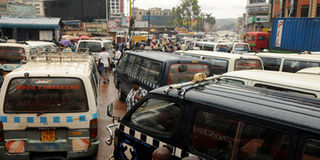Test Kampala taxis for roadworthiness

What happens inside taxis can be a great source of amusement
What you need to know:
The issue: Condition of taxis in Kampala.
Our view: Majority of the taxis look dirty and rusty, with broken chairs and doors. Others have more complicated problems such as difficulty in picking speed, trouble shifting gears, issues with lights and indicators and broken suspension systems.
Late Sunday afternoon, there was traffic at an unusual spot on the Bugolobi-Kitintale stretch in Kampala. In the middle of the road was a white taxi, with number plates yanked off.
A man carrying both number plates in his hands could be seen confronting the driver as onlookers cheered on. The taxi had allegedly rammed into another car.
A taxi tout, or conductor, from another taxi passing by the accident scene could be heard saying the freshly painted taxi had been involved in another accident just days ago, claiming it had had collided with a Subaru around the Luzira suburb.
“If a car has failed, then it has failed. It needs to get off the road,” he concluded.
If the conductor’s story is anything to go by, then what happened on Sunday afternoon is just an example of a bigger problem. Anyone who has been to Kampala will tell you that majority taxis that ply the city and its suburbs are in a dangerous mechanical condition.
Most of them look dirty and rusty, with broken chairs and doors. Others have more complicated problems such as difficulty in picking speed, trouble shifting gears, issues with lights and indicators and broken suspension systems.
Although newly registered taxis have always plied longer routes and older ones relegated to doing short trips, the trend seems to have worsened since the ban on old cars was introduced.
Beginning financial year of 2018, government moved to ban the importation of cars older than 15 years. This followed the enactment of the Traffic and Road Safety (Amendment) Act, 2018.
Under the amended Traffic and Road Safety Act, 2018, a person who imports a motor vehicle which is nine years old or more from the date of manufacture shall pay an environmental levy on that vehicle.
The ban, however, does not apply to road tractors for semitrailers, motor vehicles for the transport of goods with a gross vehicle weight of at least four tonnes, special purpose motor vehicles, agricultural or forestry tractors, and earth moving motor vehicles.
In a market dominated by the older generation of the Toyota Hiace vans, or “Kigege” as they locally called, the ban means taxi owners have to dig deeper in their pockets to buy the newer generation, or “drones” as they are popularly known.
Before the 2018 ban, one would need about Shs50m to buy a reconditioned Kigege, but one needs close to Shs70m to get a drone.
The taxi industry could be adjusting to the new prices and has previously been hit hard by the Covid-19 restrictions, but the condition of the cars needs to be checked. The lives of passenger and other road users is at stake.
Our commitment to you
We pledge:
- To be accurate and fair in all we do.
- To be respectful to all in our pursuit of the truth.
- To refuse to accept any compensation beyond that provided by Monitor Publications Ltd. for what we do in our news gathering and decision-making.
Further, we ask that we be informed whenever you feel that we have fallen short in our attempt to keep these commitments.




